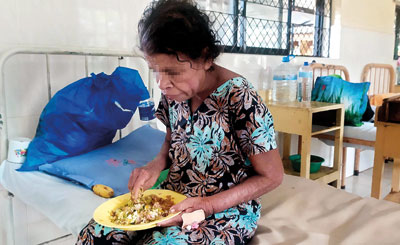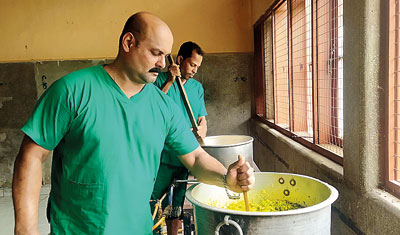News
Patients hit in the stomach as cash-strapped state hospitals struggle to give free meals
View(s):- Priorities are purchasing medicines and equipment, say hospital sources
- Lack of nutritious meals could affect recovery process
By Nadia Fazlulhaq
Providing daily healthy meals to patients is becoming a challenge for state hospitals due to cost-cutting measures and supplier issues, leaving patients with no option but to eat whatever is given.
Many patients have less visitors and less home cooked meals coming their way due to the prevailing economic crisis.
“I have an elderly wife and a sick grownup child at home. Both are unable to come and visit me with prepared meals. I have to depend heavily on food given to me here. I notice a reduction in contents from proteins in the meals and the absence of milk in tea,” said Sumanasiri, from Yakkalamulla, currently undergoing treatment at a Teaching Hospital in the South.

In state hospitals in-house patients complain that the meals they are given have gone down in quality and quantity
In addition to reduced quantities in the meals, those who require a high protein diet have also been affected. The quantity and variety of vegetables have also been reduced while in some instances tea is provided without milk or no tea at all. Some hospitals find it difficult to provide the healthier red raw rice for patients.
The Sunday Times learns that many hospitals are struggling to provide protein, especially with egg prices going up from Rs. 17 last year, to about Rs. 35 now. Fish and poultry prices have increased twofold. Dried sprats which were Rs. 740 a kilo last year are now sold between Rs. 1300-1800. Chicken is sold for Rs. 1080 a kilo. It was Rs. 450 last year. The price of Dhal has increased by about Rs. 600 a kilo while the price of pulses too are on the rise.
Many hospitals have stopped adding milk to the cup of tea provided in the morning and evening.
“Hospital meals play an important role, as one third of patients hospitalised are already malnourished. Prolonged stays put them at risk to develop infections. Their immunity needs to be strengthened,” said Dr. Renuka Jayatissa, Consultant Medical Nutritionist and Head of the Nutrition Department of the Medical Research Institute.
Dr. Jayatissa said the diet plays an important role in the recovery process of many patients.
“Those who are severely malnourished need to be given supplements. Unfortunately the health system is struggling to find supplements as the priority now is to find medicines. We have to sometimes turn away patients at government hospital clinics due to shortage of supplements,” she said.
She requested kind donors to approach the Sri Lanka Medical Nutrition Association and support to purchase supplements for state hospitals.
“Malnutrition has a huge impact on children as well. Not only will it affect their physical growth, but also their cognitive growth and could make them prone to non-communicable diseases in adult life,” she warned.

Meals being prepared for patients at the Puttalam hospital. Pix by Hiran Priyankara
A video of a parent showing a plate of rice served at the Lady Ridgeway Children’s Hospital (LRH) consisting of a cabbage mellum with no egg or dhal went viral last week.
“The hospital is currently receiving donations in the form of food and dry rations. This is a kind move at a time of a crisis. In a cross sectional study it was revealed that about 20 percent of children admitted to the hospital are malnourished with many from extremely low income backgrounds suffering from acute malnourishment,” said LRH Consultant Pediatrician Dr. Deepal Perera.
“Lots of complaints are being heard from hospital kitchens. With limited budgets and suppliers reluctant to provide goods until payments are made are creating chaos. All measures are being taken to cut costs. This is reflected in the meals provided,” Saman Ratnapriya of the Government Nursing Officers Association (GMOA) said.
“Some suppliers have not been paid on time. So they are reluctant to supply especially when there is a shortage, price hikes and fuel crisis.Some require high protein diets, burnt victims also need high protein diets for quick recovery. Some suppliers are reluctant to give for old prices mentioned in previous year’s tenders,” he said.
We have limited allocation for food as the main concern at is acquiring medicines and lab equipment, said a senior doctor at a government hospital.
Additional reporting by Sirangika Lokukarawita
| Plea for insulin: A doctor takes to social media A doctor from the Castle Street Hospital for Women resorted to social media to appeal to donors to help get insulin urgently needed for mothers. Consultant Neuroradiologist Dr. Saman Kumara, on behalf of the Castle Street Hospital made an urgent appeal for soluble insulin vials to treat pregnant mothers suffering from diabetes. He said they are in urgent need of 300 soluble insulin vials for the next two months. “Close to 1000 babies are born in this hospital every month. At present we have run out of soluble insulin vials. We humbly request kind donors to help save both the lives of mothers suffering from diabetes and their babies,” Dr. Kumara said. | |
The best way to say that you found the home of your dreams is by finding it on Hitad.lk. We have listings for apartments for sale or rent in Sri Lanka, no matter what locale you're looking for! Whether you live in Colombo, Galle, Kandy, Matara, Jaffna and more - we've got them all!

